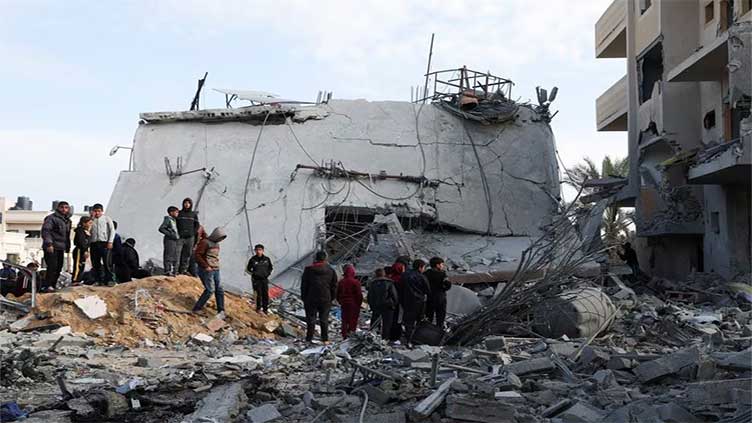Israel bombards Gaza, with biggest functioning hospital under siege

World
Israel bombards Gaza, with biggest functioning hospital under siege
CAIRO (Reuters) – Gaza's largest functioning hospital was under siege on Friday in Israel's war with Islamist group Hamas, leaving patients and doctors helpless in the chaos, as warplanes struck Rafah, the last refuge for Palestinians in the enclave, officials said.
Israeli forces said on Thursday they had raided the medical complex as footage showed shouting and gunfire in dark corridors in an incursion that raised fresh alarm over the fate of hundreds of patients and medical workers and the many displaced Palestinians who had sought shelter there from the fighting.
Israel's military called the raid on Nasser Hospital "precise and limited" and said it was based on information that Hamas fighters were hiding and had kept hostages in the facility, with some bodies of captives possibly there.
The Health Ministry in Gaza said on Friday that five patients at the hospital died in intensive care as a result of power outages and the cessation of oxygen supply.
The World Health Organization (WHO) said on Friday it was trying to reach Nasser Hospital, after the Israeli raid.
"There are still critically injured and sick patients that are inside the hospital," WHO spokesperson Tarik Jasarevic said.
"There is an urgent need to deliver fuel to ensure the continuation of the provision of life-saving services... We are trying to get access because people who are still in Nasser medical complex need assistance."
The Israeli military said troops had detained more than 20 Palestinians it said had been involved in the Oct. 7 attack in the raid and detained dozens of others for questioning. It said soldiers had also found ammunition and weapons in the hospital.
The Gaza Health Ministry said earlier this week that there were 10,000 people sheltering at the hospital but many had left because they feared the Israeli raid was imminent.
The war began when Iran-backed Hamas sent fighters into Israel, killing 1,200 people, mostly civilians, and seizing 253 hostages, according to Israeli tallies.
Israel's air and ground offensive has since devastated tiny, Gaza, killing 28,775 people, also mostly civilian, according to Palestinian health authorities, and forcing nearly all of its more than 2 million inhabitants from their homes.
ALL EYES ON HOSPITAL
Officials and witnesses say Israel has hit schools, universities, state institutions and mosques in its bombardment of Hamas, the Palestinian group that runs the enclave where its leaders -- whom Israel has vowed to hunt down -- are believed to be hiding, possibly in a complex underground tunnel network.
Gaza's health authorities said Israel had forced out dozens of staff, patients, displaced people and families of medical staff sheltering in the Nasser hospital.
Power generators have stopped, and electricity has been completely cut off from the compound.
Two pregnant women had given birth “under tough conditions, no water, no food and no way of warming them up,” in such cold weather, said ministry spokesman Ashraf Al-Qidra.
The Gaza health ministry said Israeli forces inside Nasser Hospital forced women and children to go into the maternity department, which it had turned into a military area. Women were not allowed to take in any of their belongings.
There is mounting international concern the humanitarian crisis in Gaza could worsen sharply if the Israeli military decides to storm the southern border city of Rafah, where more than half of the densely populated enclave's people are taking shelter in anticipation of a major attack.
An Israeli air strike hit two houses in Rafah in the southern Gaza Strip, killing 10 people and wounding several others, health officials said.
Rida Sobh, mourning the death of her sister in one of the Rafah strikes, said the house had been totally destroyed in the midnight attack, which also killed all her sister's children, her aunt, husband and cousin.
"Rafah is not safe, everywhere in the Gaza Strip is a target, don't say that Rafah is safe, from Beit Hanoun to Rafah, it is all dangerous, there is no safety at all, don't say that there is - safety is only with God, but here there is no security at all."
In Khan Younis, Israeli planes and tanks continued to bomb areas across the city.


